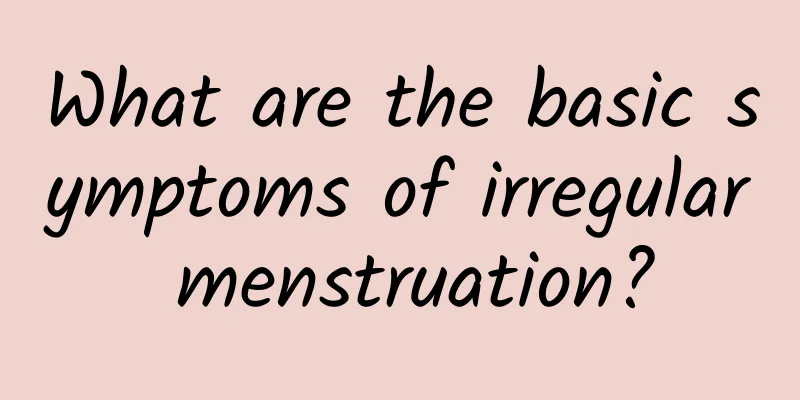What are the basic symptoms of irregular menstruation?

|
Menstrual disorders, also known as irregular menstruation, are a common gynecological disease. Irregular menstruation brings a lot of troubles to female friends, and also seriously affects the patient's physical and mental health. What are the basic symptoms of irregular menstruation? Let's ask experts to introduce some basic symptoms of irregular menstruation. Menstrual disorders are manifested as abnormal menstrual cycles or bleeding, or abdominal pain and systemic symptoms before menstruation. The cause may be organic disease or dysfunction. Blood disease, hypertension, liver disease, endocrine disease, miscarriage, ectopic pregnancy, hydatidiform mole, reproductive tract infection, tumors (such as ovarian tumors, uterine fibroids), etc. can all cause menstrual disorders. Basic symptoms of irregular menstruation: 1. Early menstruation Early menstruation refers to a shortened menstrual cycle that is shorter than 21 days and occurs for more than two consecutive cycles. It is a biphasic basal body temperature of ovulatory functional uterine bleeding, a short follicular phase of only 7 to 8 days, or a luteal phase of less than 10 days, or a temperature rise of less than 0.5°C. 2. Delayed menstruation: Menstruation is delayed for more than 7 days, or even 40 to 50 days, and occurs for more than two consecutive menstrual cycles. For those who ovulate, the basal body temperature is biphasic, but the follicular phase is long and the high temperature phase is low; for those who do not ovulate, the basal body temperature is monophasic. 3. Prolonged menstruation. The menstrual cycle is normal, but the menstrual period is prolonged, exceeding 7 days or even 2 weeks. Those with inflammation usually have lower abdominal pain, which is aggravated during menstruation. Usually, the amount of vaginal discharge is heavy, yellow or yellow-white, thick and smelly. Those with incomplete corpus luteum atrophy also have heavy menstrual flow; those with prolonged endometrial repair still have a small amount of continuous vaginal bleeding after the normal menstrual period. 4. Menstrual disorders include irregular menstruation, early or delayed menstruation, and a cycle that is shorter than 21 days or longer than 35 days. The above is an introduction to the basic symptoms of irregular menstruation. I hope everyone can pay attention to it. If you have symptoms of irregular menstruation, please go to the hospital in time to avoid delaying the condition and causing serious harm. If you have any questions about irregular menstruation, please consult our online experts for answers. I wish you a speedy recovery! Irregular menstruation http://www..com.cn/fuke/yjbt/ |
<<: What are the prevention methods for adnexitis?
>>: A brief discussion on the causes of irregular menstruation
Recommend
What is the reason for miscarriage when sperm does not liquefy?
Sperm failure to liquefy may lead to fertility di...
Causes of recurrent ovarian cysts
What are the causes of recurrence of ovarian cyst...
What are the physical characteristics of patients with acute ectopic pregnancy?
Acute ectopic pregnancy is a common clinical type...
What are the causes of cervical erosion? Can unclean sexual life also cause cervical erosion?
Cause of cervical erosion 1: unclean sexual life ...
What are the preparations before painless abortion?
Painless abortion is very popular now. It is the ...
What happens if my vulva itches after my period?
What happens if my vulva itches after my period? ...
What are the symptoms of malignant ovarian cysts? Is it dangerous?
What are the symptoms of a malignant ovarian cyst...
If you can’t lose weight by running, be careful that you may be suffering from muscle-less obesity!
[Key Points]: Why can’t I lose weight even though...
How to cure cervical erosion?
Cervical erosion is a terrible existence for many...
Medication issues for patients with endometrial tuberculosis
Endometrial tuberculosis is a disease that can af...
What should I do if I have cervical erosion and polyps after childbirth?
What should I do if I have cervical erosion and p...
Symptoms of uterine fibroids that women may suffer from in their daily lives
Diseases can easily occur inside the uterus, and ...
What complications can vaginitis cause?
Vaginitis, or inflammation of the vagina, is a gr...
Is there a good chance of curing bacterial vaginosis?
Common methods for treating bacterial vaginitis. ...
What is the recurrence rate of cervical warts?
It is an indisputable fact that the recurrence ra...









